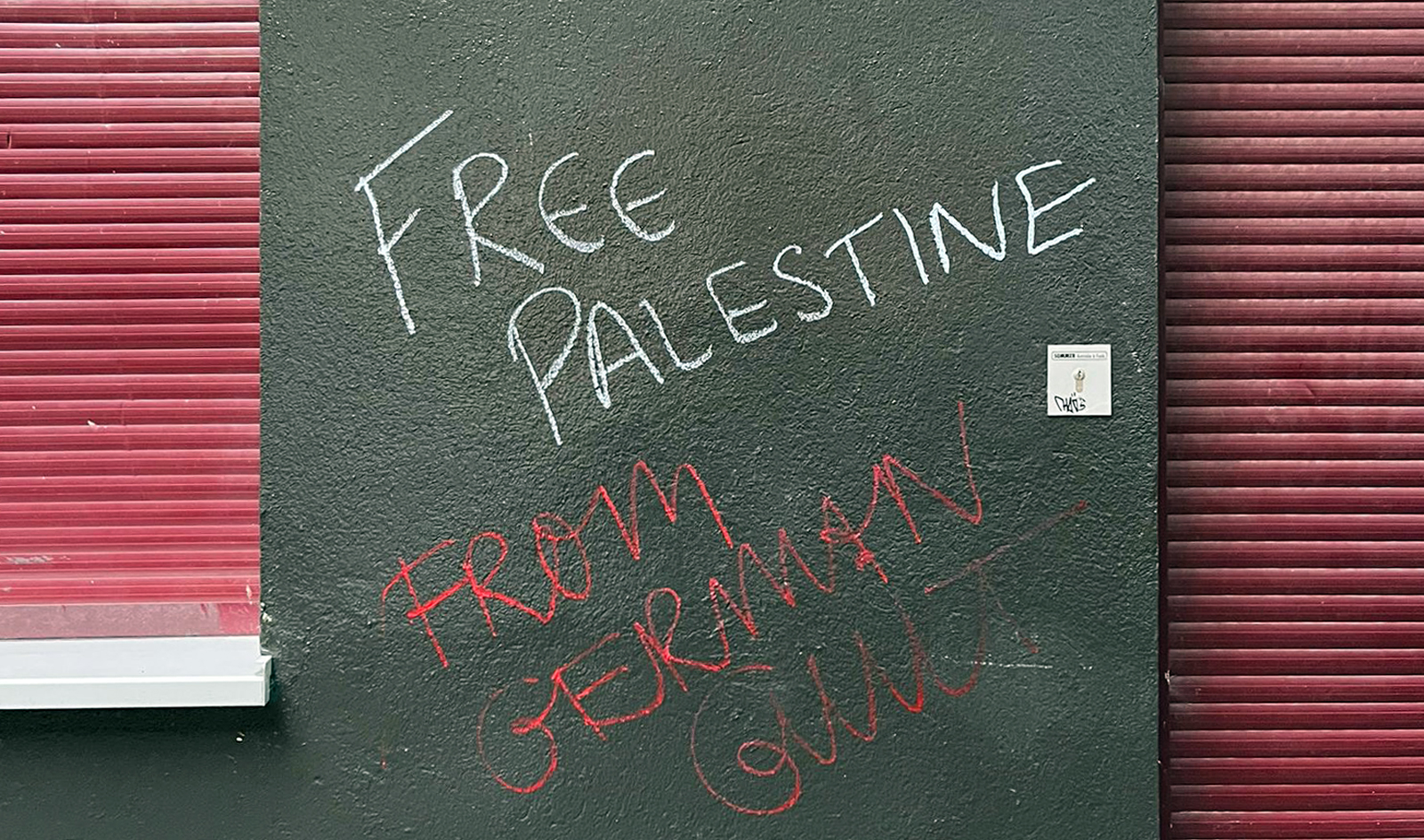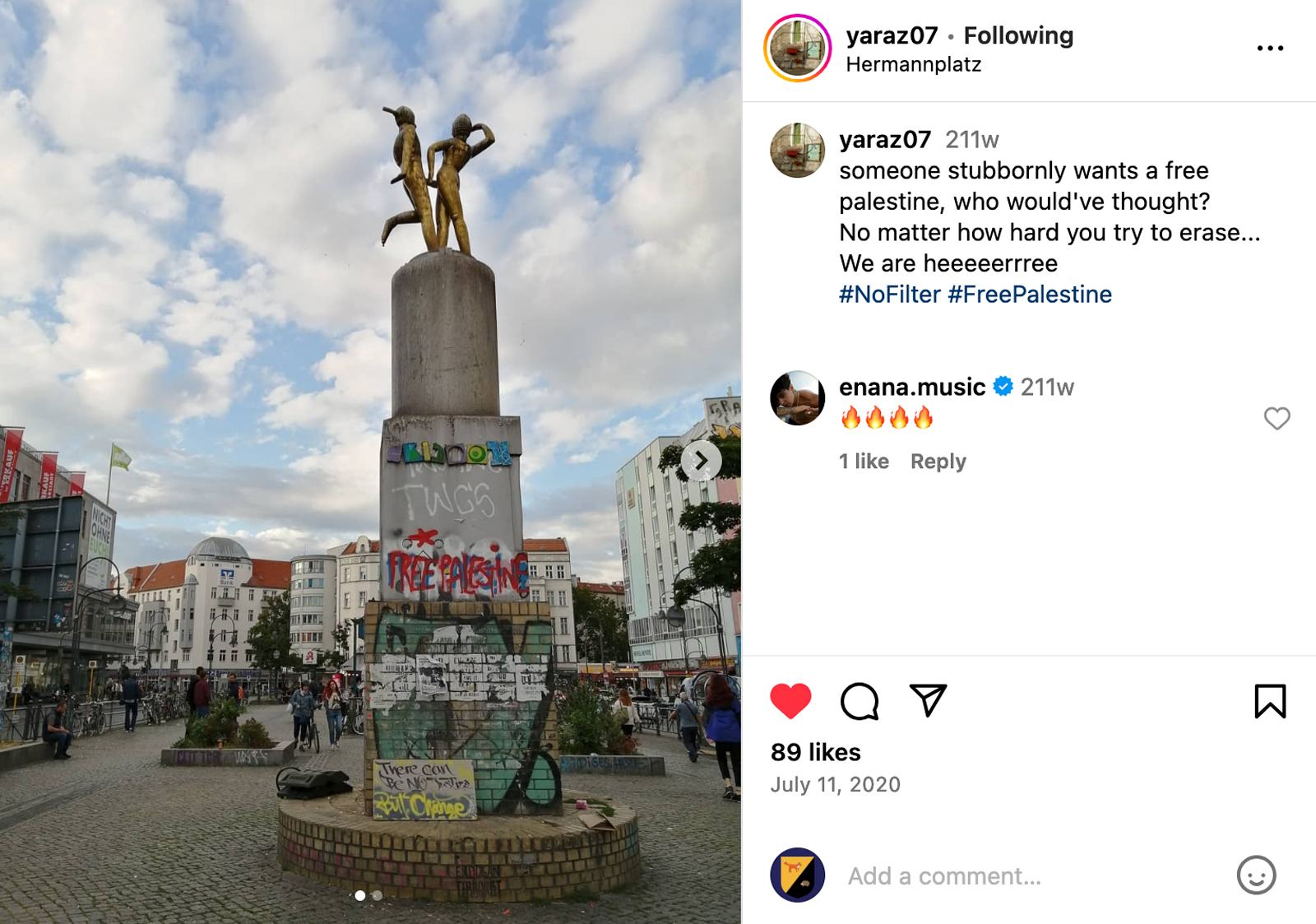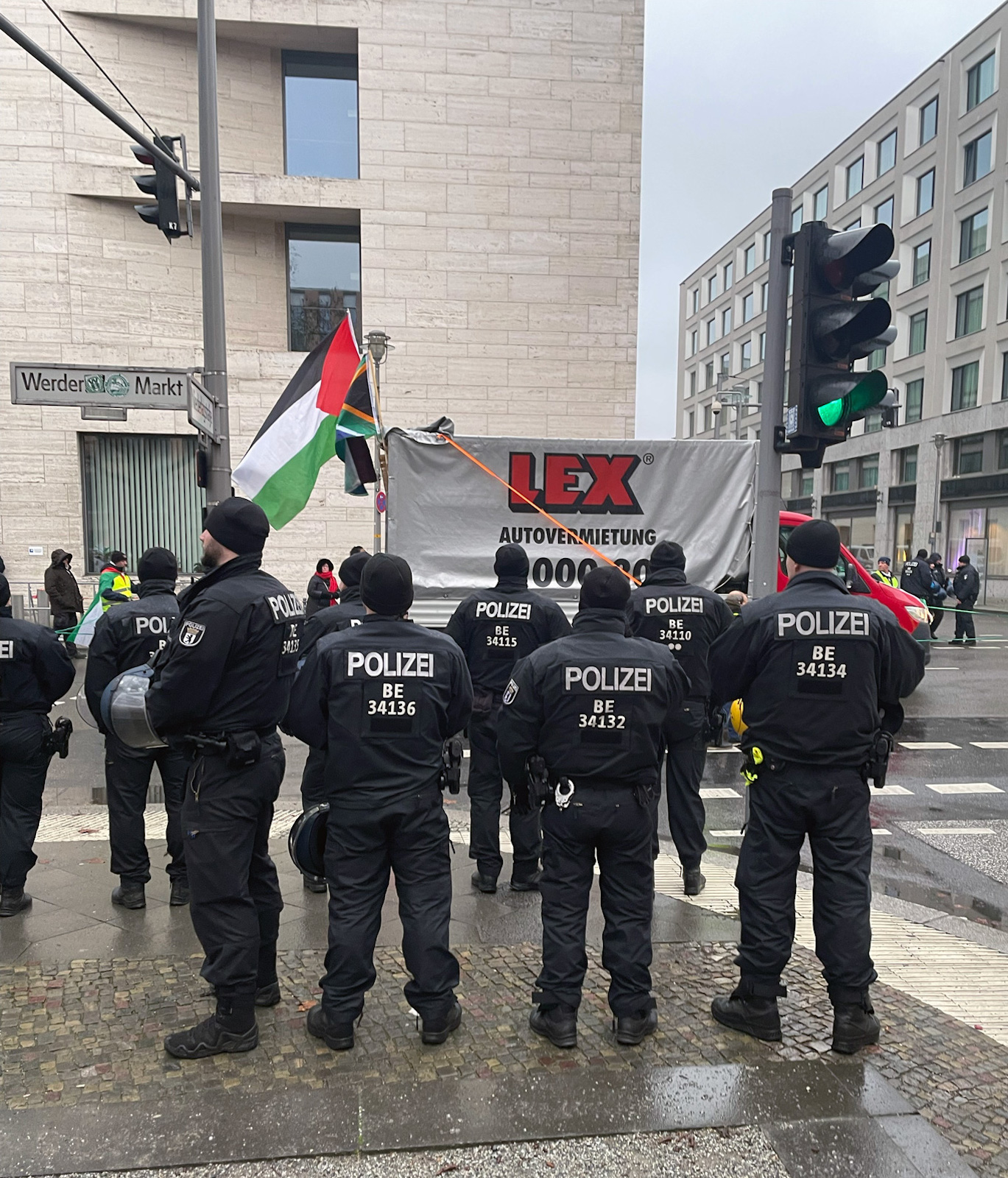Oblivion Culture
Countering the German taboo on Palestinian trauma
Sarah El Bulbeisi

The Holocaust and the Nakba—the expulsion of Palestinians from historical Palestine, which has been ongoing since the end of 1947—are deeply intertwined. The Nakba is, among other things, a direct consequence of the Holocaust. Yet it is excluded from German collective memory, its relationship to German history only legible negatively in the representation of Israel as a safe haven for Jews. The nation’s once-lauded “memory culture” never links Israel’s self-conception as a Jewish state to the systematic expulsion and dispossession of Palestinians. The violence experienced by Palestinians must remain unspoken, taboo. When made visible, it becomes threatening—something that competes with the Holocaust and contaminates the German culture of remembrance. This is why the violence against Palestinians cannot be acknowledged as a continuation of European anti-Semitism. Doing so would force Germany—home to the largest Palestinian community in Europe—to confront the ongoing present of its history and to acknowledge that the nation’s moral rehabilitation is incomplete.
The taboo on the Palestinian experience of violence is so powerful that it necessitates socially rejecting Palestinianness itself. The Palestinian experience is so unpleasantly close to the Jewish experience, that sometimes—according to Edward Said—one cannot even pronounce the word “Palestine.”[1] This closeness of the Jewish and Palestinian experiences renders Palestinian visibility embarrassing, even for Palestinians themselves. Traces of this fear of Palestinian visibility can be found in the representation of Palestinianness as deviating from the moral norm, as one-sided, ideological, radical, violent, and riddled with anti-Semitism.
In my book Tabu, Trauma und Identität: Subjektkonstruktionen von PalästinenserInnen in Deutschland und der Schweiz, 1960–2015 (Taboo, trauma, and identity: Subject constructions of Palestinians in Germany and Switzerland, 1960–2015), I explored how Germany’s selective remembering and forgetting—the institutionalized remembering of the Holocaust and the institutionalized forgetting of the Nakba—affects its Palestinian immigrants and their children, second-generation Palestinian-Germans born there. The social taboo surrounding their collective experience of displacement repeats and deepens this violence and trauma—leading to the dissolution of the self, to melancholia, and to feelings of invisibility, absence, guilt, and shame on the inside and to self-negation on the outside. But while first-generation Palestinians remain caught in their trauma, their children have begun to transform it into agency, reclaiming their socially discarded identity and history and replacing self-negation with a politics of visibility.

Life stories and conversations, as well as (auto-)ethnographic observations, have been important to my work, as has psychoanalysis, which provides the tools and vocabulary to explore taboo and trauma in a social science context. Both taboo and trauma are, by definition, outside the realm of narrative, but psychoanalysis has dedicated itself to the challenge of finding a language for what actually happens beyond language, one that can articulate the experience of suffering from the social norm, or of pain that does not comply with that norm.
Enlarging the narrow medical perception of trauma as an individual phenomenon, the psychoanalyst Hans Keilson was one of the first to draw attention to the role played by the social environment. In his study of Jewish war orphans, he showed that trauma is more than simply an individual’s reaction to an event that overwhelms the psyche; it is also a process and structure where the way in which society at large deals with violent experiences is an essential factor in how individuals cope with them. For example, recurring experiences of exclusion—the tabooing of experiences of violence and the disregard and systematic denial of one’s own perception—can have a traumatic effect. Palestinians in Germany experience social exclusion not only individually, but collectively.
Taboo and trauma are therefore closely linked in the Palestinian context. A second-generation Palestinian-German explained to me how she was always mistaken for a Jew when she was a student because she was so “free.” She let people believe this because it was more comfortable to be perceived as Jewish. The Jewish experience was similar to the Palestinian experience, but not taboo. Over time, she had built up what she described as a “totally artificial identity” into which she could put all her pain.[2] This repression is a repetition: it repeats and deepens the physically experienced violence of ethnic cleansing, thereby adding to the original trauma. She described her method of self-preservation as an act of substitution: in order to be able to share with those around her the pain of her family’s history of expulsion, she slipped into another identity, hiding her pain in the pain of the Jewish other. In order to be recognized as a human being, she enacted a form of violence on herself that she experienced repeatedly in society: the overwriting of her Palestinian experience with the Jewish experience in Europe.
A decisive part of the trauma experienced by Palestinians in Germany comes not only from its being rendered taboo, but also from what Pierre Bourdieu calls symbolic violence. The term describes the violence of those discourses that normalize and legitimize systemic violence, that is, the violence that emanates from political and economic systems. Symbolic violence justifies the expulsion and dispossession of Palestinians and the seizure of their land in various ways: the violent act of expulsion is trivialized, presented as controversial, accidental, or self-inflicted—or even “undone,” to use the language of psychoanalysis, which is to say, annulled. By denying the existence of Palestinians in historical Palestine or their connection to the land, the reality of violence is erased. And finally, violence against them is morally justified via a victim-perpetrator dichotomy in which they are locked into the position of perpetrator and moral deviant. Palestinians have been, and continue to be, contrasted in ever-new variations as threatening savages, terrorists, Islamist extremists, and anti-Semites, while Israel is included in so-called Christian-Jewish Western culture and its community of values.

In Germany, demonizing representations of Palestinians went historically hand in hand with practices of criminalization, such as surveillance, censorship, expulsions, bans on assemblies, and the dissolution of student associations and workers’ unions. As a result, the violence experienced by Palestinians appears to be justified. Palestinians thus become people who deserve to suffer violence, and many, especially in the first generation, have felt the violence they experienced as something self-inflicted and shameful. In this way, they were dispossessed of their experience. Symbolic violence repeated and intensified the physical violence of their expulsions and ultimately desubjectified them. Narratives of Palestinian insignificance resulted not only in a fear of visibility and political activism but also in the fear of feeling, let alone expressing, anger and grief. Many Palestinians are unable to mourn their experience of violence because it does not officially exist. This has led to melancholia and withdrawal from society, family, and other Palestinians—to isolation, social death, and suicidal lives. Guilt and shame dissolved them as subjects; the power of the discourses that negated Palestinians literally dematerialized them. Given that they cannot be seen as human beings or mourned as such, many have at some point denied or hidden their identity in public in order to avoid the pain of being socially stigmatized. Symbolic violence not only made the members of the first generation invisible, but also became an important aspect of their relationship with their children, which was characterized by parental melancholia. Their invisibility was inscribed as an emotional absence in the familial context, which contributed significantly to how traumatic experiences were passed on.
For many second-generation Palestinian-Germans, the 2014 Israeli military offensive in Gaza marked a turning point, as the tabooing and justification of Palestinian experiences of violence further intensified. The disproportionate use of force by the Israeli army, which led to the killing of hundreds of civilians, was presented in Germany as necessary, and Israel’s narrative of a war of self-defense was adopted without reservation. Palestinians who protested against this were disappeared as individuals and transformed into an anti-Semitic Palestinian collective subject. This increased feelings of mistrust toward the society in which they had grown up, a sense that they were living in exile in the land of their birth. While many in the second generation had previously excused the lack of empathy toward Palestinians as ignorance, they now interpreted it as anti-Palestinian racism. They broke with the self-negation often imposed on them by their parents, and began to overcome their isolation and fear of visibility and activism, to build national and transnational solidarities, and to work against fragmentation. The second generation also discovered the grief and anger that their parents had been denied and began to explore and reappropriate their socially rejected history—both familial and national—and identity, transforming guilt and shame into pride, and the powerlessness of traumatic existence into agency.
This intergenerational development, which led to a mental and affective repossession of lost experience, belonging, and self-efficacy, has taken on a new dimension with the current genocide in Gaza—undertaken with Germany’s military and moral support—intensifying the taboo on Palestinian trauma to an unprecedented level. In German politics and media, the genocide has been justified as a war against anti-Semitism, a war that is extending more and more to Palestinians in Germany as well. For Palestinian-Germans, the boundaries between “here”—Germany—and “there”—historical Palestine—are becoming more and more blurred. The continuous justification of Israeli state violence in public discourse is experienced as an incessant repetition of the collective trauma of ethnic cleansing, with hardly an end in sight. Symbolic violence—the demonization of Palestinian identity—is increasingly institutionalized, resulting in state-induced restrictions on Palestinian visibility in public spaces and in extreme police violence, among other things. Nevertheless, second- and third-generation Palestinian-Germans are becoming more and more visible, showing their Palestinianness in public spaces, taking to the streets regularly, accusing Germany of complicity in genocide, and organizing themselves in grassroots movements advocating for the right of Palestinians to freedom and equality.
While self-ethnicization among second- and third-generation Palestinians has become a coping mechanism for dealing with the experience of erasure, they also view Palestinianness as an identity whose anti-colonial and anti-racist resistance is aligned with similar movements initiated by other subordinated social groups. I had often wondered whether resistance to racializing violence is possible without repeating it. Seeing this inclusive and intersectional struggle for equality and self-determination has shown me that it is.
This article has been adapted from a talk given as part of the “Provincializing Germany and the Politics of Memory” panel during the “Witnessing Atrocities: Dissent in the Wake of Gaza” conference held at Spore Initiative, Berlin, on 26–28 April 2024.
- Edward W. Said, “On Lost Causes,” in Said, Reflections on Exile and Other Essays (Cambridge, MA: Harvard University Press, 2000), p. 545.
- See my Tabu, Trauma und Identität: Subjektkonstruktionen von PalästinenserInnen in Deutschland und der Schweiz, 1960–2015 (Bielefeld, Germany: Transcript Verlag, 2020), p. 218. My translation.
Sarah El Bulbeisi is a researcher at the Orient-Institut Beirut (OIB). Prior to that, she was a researcher and lecturer at the Institute for Near and Middle East Studies at LMU Munich and led “Violence, Forced Migration and Exile: Trauma in the Arab World and in Germany,” a Higher Education Dialogue project between Palestinian and Lebanese universities, as well as LMU Munich. She is the author of Tabu, Trauma und Identität: Subjektkonstruktionen von PalästinenserInnen in Deutschland und der Schweiz, 1960–2015 (Transcript Verlag, 2020) and “Palestine in the Imagination of the Imperial German Self: Gustav Dalman and the Bavarian War Archive,” in “Palestine from Above: Surveillance, Cartography, and Control (Part 2),” special issue, Jerusalem Quarterly, no. 82 (Summer 2020).
Spotted an error? Email us at corrections at cabinetmagazine dot org.
If you’ve enjoyed the free articles that we offer on our site, please consider subscribing to our nonprofit magazine. You get twelve online issues and unlimited access to all our archives.